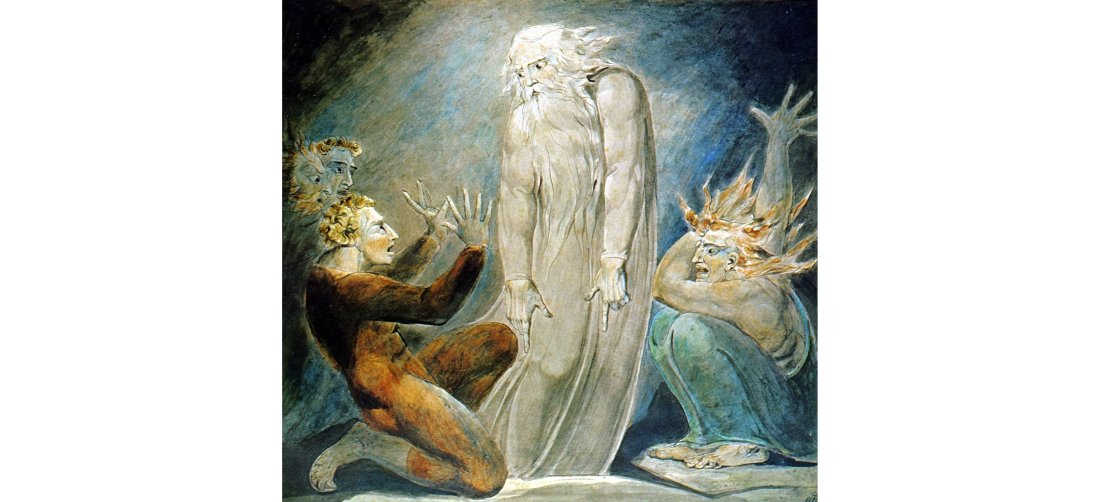Rethinking Traditional Interpretations Series
Desperate for guidance about an impending battle with the Philistines, King Saul visits the home of a medium in Endor. He asks her to contact the departed prophet Samuel for him.
The woman contacts Samuel
11 Then the woman said, “Whom shall I bring up for you?” And he said, “Bring up Samuel for me.”
12 When the woman saw Samuel, she cried out with a loud voice. And the woman spoke to Saul, saying, “Why have you deceived me? For you are Saul!”
–1 Samuel 28:11-12 NKJV
The spirit whom the woman sees clairvoyantly is Samuel. When she perceives him, she realizes who her disguised visitor is and that Saul has attempted to deceive her.
Does she know this by revelation or by inference? Perhaps a bit of both.
13 And the king said to her, “Do not be afraid. What did you see?” And the woman said to Saul, “I saw a spirit ascending out of the earth.”
14 So he said to her, “What is his form?” And she said, “An old man is coming up, and he is covered with a mantle.” And Saul perceived that it was Samuel, and he stooped with his face to the ground and bowed down.
–1 Samuel 28:13-14 NKJV
The woman explains that she sees the spirit of an old man rising from the earth, robed in the mantle of a prophet (1 Sam. 15:27).
The typical Evangelical and Pentecostal interpretation is that this wasn’t really Samuel, but a demon! Booga booga!
I dissent.
Maggie Cole declares, “I strongly disagree with any discussion that considers there was an evil force behind the raising of Samuel because the prophet could only work for Yahweh, even in death” (The Medium of Endor, part 2).
Even Jesus said of Abraham, Isaac, and Jacob that God “is not the God of the dead, but of the living. You are badly mistaken!” (Mark 12:27 NIV)
The passage establishes that the visual and auditory information from the spirit world is being relayed through the medium. By the woman’s description, Saul recognizes the spirit as Samuel.
Then Samuel speaks.
Samuel’s message to Saul
Now Samuel said to Saul, “Why have you disturbed me by bringing me up?” And Saul answered, “I am deeply distressed; for the Philistines make war against me, and God has departed from me and does not answer me anymore, neither by prophets nor by dreams. Therefore I have called you, that you may reveal to me what I should do.”
–1 Samuel 28:15 NKJV
Samuel declares through the woman that Saul is “disturbing” him, meaning to quiver with violent emotion, especially anger; to trouble; to disquiet (rāgaz, Strong’s H7264). “Called” is qārā (Strong’s H7121), meaning to cry out with the idea of accosting someone. Saul is desperate.
Samuel continues his diatribe through the medium:
16 Then Samuel said: “Why then do you ask me, seeing the LORD has departed from you and has become your enemy?”
17 “And the LORD has done for Himself as He spoke by me. For the LORD has torn the kingdom out of your hand and given it to your neighbor, David.
18 Because you did not obey the voice of the LORD…, therefore the LORD has done this thing to you this day.
19 Moreover the LORD will also deliver Israel with you into the hand of the Philistines. And tomorrow you and your sons will be with me. The LORD will also deliver the army of Israel into the hand of the Philistines.”
–1 Samuel 28:16-19 NKJV
The departed Samuel is no happier with Saul now than when in the body. He delivers the same message that he gave Saul when he was still alive, adding a word about Saul’s fate and the outcome of the battle.
The Jewish Apocrypha mentions that Samuel did prophesy after his (physical) death: “Even after [Samuel] had fallen asleep, he prophesied and made known to the king his death, and lifted up his voice from the ground in prophecy, to blot out the wickedness of the people” (Sirach 46:20 NRSV).
The medium delivered a true message from Samuel—and from the Lord. She didn’t sugar-coat it; she gave what she got, even when she knew she was speaking to the king, who had the power to execute her.
The woman’s message from the prophet is so convincing that Saul suffers a terrible moment of recognition.
Then immediately Saul fell full length on the ground, and was dreadfully afraid because of the words of Samuel. And there was no strength in him, for he had eaten no food all day or all night.
–1 Samuel 28:20 NKJV
How the woman of Endor responds
What does the woman do when faced with Saul’s behavior?
She acts kindly.
21 And the woman came to Saul and saw that he was severely troubled, and said to him, “Look, your maidservant has obeyed your voice, and I have put my life in my hands and heeded the words which you spoke to me.
22 Now therefore, please, heed also the voice of your maidservant, and let me set a piece of bread before you; and eat, that you may have strength when you go on your way.”
23 But he refused and said, “I will not eat.” So his servants, together with the woman, urged him; and he heeded their voice. Then he arose from the ground and sat on the bed.
24 Now the woman had a fatted calf in the house, and she hastened to kill it. And she took flour and kneaded it, and baked unleavened bread from it.
25 So she brought it before Saul and his servants, and they ate. Then they rose and went away that night.
–1 Samuel 28:21-25 NKJV
When Saul faints at the dire message from Samuel, the woman humbly calls herself his “maidservant.” She urges him to eat, refusing to take no for an answer. She not only bakes unleavened bread, but kills a fatted calf—a costly meal.
Who else in the Bible killed a fatted calf?
Godly hospitality: killing the fatted calf
When two angels and the Lord visit Abraham, he bakes bread and kills a choice calf for a lavish meal (Gen. 18:7-8).
In Jesus’ parable of the Prodigal Son, when the wayward young man returns home, the father, overjoyed, says, “Bring the fattened calf and kill it. Let’s have a feast and celebrate” (Luke 15:23 NIV).
In ancient Eastern cultures, such provision is a sign of hospitality and acceptance. It’s also a demonstration of godly honor and forgiveness:
21 If your enemy is hungry, give him food to eat; if he is thirsty, give him water to drink.
22 In doing this, you will heap burning coals on his head, and the Lord will reward you.
–Proverbs 25:21-22 NIV
Apostle Paul quotes this passage in Romans 12:20, and a similar sentiment appears in 2 Kings 6:22. Jesus encourages us to love our enemies this way in Matthew 5:44 and Luke 6:27.
Susan Pigott observes that this “sacrificial meal serves as a fitting marker of the end of Saul’s reign and further defines the woman’s prophetic role.” (“1 Samuel 28—Saul and the Not so Wicked Witch of Endor,” Review and Expositor 95 [1998]: 440. Emphasis mine.)
The medium is a discerning woman who delivers a genuine prophetic message. The woman of Endor shows the wayward Saul hospitality, honor, forgiveness—and Christlike love.
Though Samuel’s message to the wayward king is ominous, it contains grace. Samuel promises that, although Saul and his sons will die in battle, they will join him in the afterlife.
Samuel’s mother Hannah prophesied when she dedicated the boy to God’s service: “The Lord brings death and makes alive; he brings down to the grave and raises up” (1 Sam. 2:6 NIV). We see this fulfilled in Samuel’s beyond-the-grave counsel to Saul.
Our lesson from Saul
What does King Saul portray in this account?
Up to this point in the story, he has disobeyed the Lord’s instruction through Prophet Samuel, which results in losing his political position. In extreme military straits with the Philistine army bearing down on the nation, he gives way to fear.
Although he inquires of the Lord for guidance through traditional means, he has already been given direction, and no more is forthcoming. He then seeks a medium to contact the departed Samuel for a different message. He dons a deceptive guise to fool the woman.
We see in Saul disobedience to God; refusal to accept prophetic counsel; jealous pursuit of David, an innocent and loyal subject; callous murder of God’s priests (1 Sam. 22:17-18); cowardice; loss of integrity; and deceptiveness.
Our lesson from the woman of Endor
What do we see in the woman of Endor?
Respect for the law of the land, true gifting and integrity in its use—albeit unorthodox in that time and place. Compassion, empathy, kindness. The grace and hospitality of Abraham and the forgiveness of the Prodigal Father. The love of Christ.
What does the Bible say about mediums? Good things, thanks to the kind woman of Endor.
More information:
The Kind Woman of Endor, part 1


 (I still ponder whether Sabrina’s mother-in-law on the TV show Bewitched was named “Endora” after this biblical figure. In name only, for the woman of Endor was kind, and Endora was anything but!)
(I still ponder whether Sabrina’s mother-in-law on the TV show Bewitched was named “Endora” after this biblical figure. In name only, for the woman of Endor was kind, and Endora was anything but!)